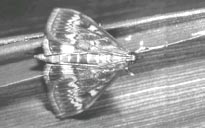Risky business
 Sufficient evidence exists to suggest that biotechnology could have some nasty surprises, unless we proceed with caution. A University of Illinois study published in the June 2000 found that Event 176 corn seeds produced by Novartis Seeds altered to contain the gene from the Bacillus thuringiensis (Bt), a toxin which works as a pesticide against pests such as bollworm and corn borer. A Cornell University study published earlier in May 1999 found that Novartis' YieldGard Bt corn (Bt 11) was toxic to monarch butterflies. A University of Iowa study, published in October 2000 confirmed the two results. The studies show that
Sufficient evidence exists to suggest that biotechnology could have some nasty surprises, unless we proceed with caution. A University of Illinois study published in the June 2000 found that Event 176 corn seeds produced by Novartis Seeds altered to contain the gene from the Bacillus thuringiensis (Bt), a toxin which works as a pesticide against pests such as bollworm and corn borer. A Cornell University study published earlier in May 1999 found that Novartis' YieldGard Bt corn (Bt 11) was toxic to monarch butterflies. A University of Iowa study, published in October 2000 confirmed the two results. The studies show that
Related Content
- Adapt to survive: business transformation in a time of uncertainty
- New study: Risky roads cause more than just environmental harm
- From risk to return: investing in a clean energy economy
- From risk to return: investing in a clean energy economy
- On the frontline: climate change and rural communities
- Damning the Amazon: the risky business of hydropower in the Amazon
